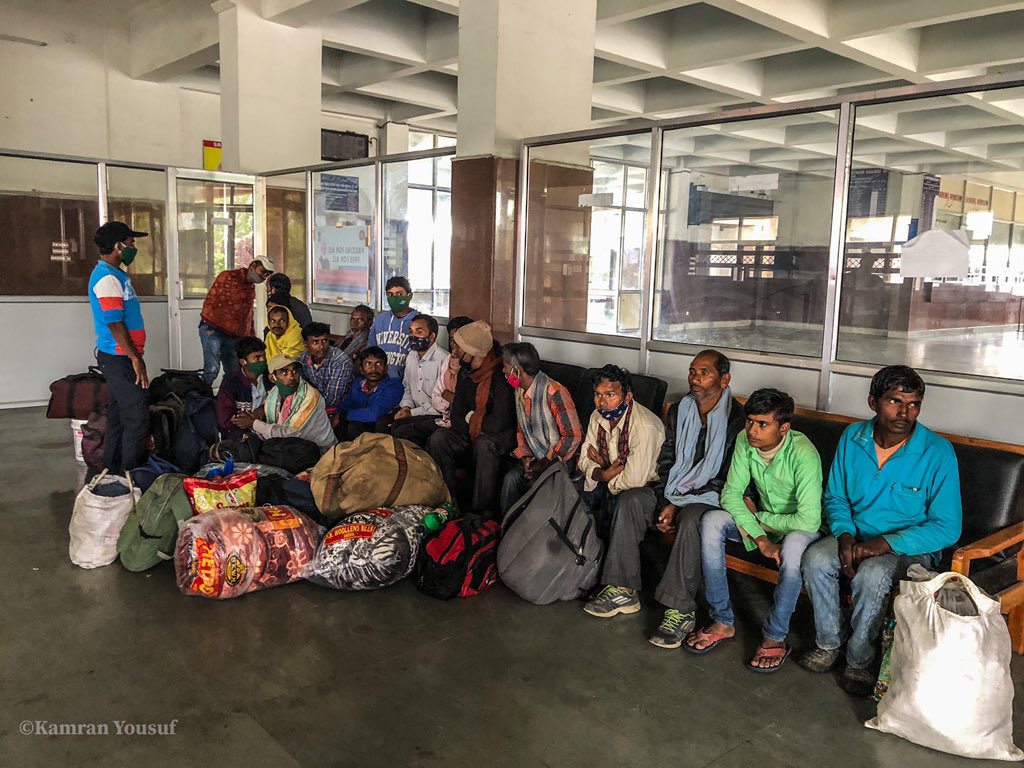Non-local Workers Fear Life Amid Fresh Spate of Violence

Muhammad Raafi is a desk editor at the Mountain Ink.…
Many non-local labourers were seen boarding trains at Nowgam railway station and contract carriage vehicles in Lalchowk.
SRINAGAR — Thousands of non-local labourers who travel to Kashmir in summers to make a living are fearful for their life. The reason being the fresh spate of attacks that killed at least four of them in the last week, across Kashmir.
On Sunday evening, suspected militants fired at non-local labourers at the Wanpoh area of south Kashmir’s Kulgam district, killing two and injuring one. This was the third attack as two non-local labourers were killed in two separate attacks on Saturday.
Those killed on Sunday were identified as Raja Reshi Dev and Joginder Reshi Dev. Chunchun Reshi Dev was injured. All of them are residents of Bihar.
After Sunday’s attack, many non-local labourers are fleeing Kashmir. On Monday morning, dozens of such labourers boarded trains and contract carriage vehicles to reach Jammu.
Late Sunday evening, Kashmir police chief Vijay Kumar told the media that vulnerable non-local labourers in Kashmir will be moved to army and police camps for protection. “I have directed officers to shift the vulnerable urgently,” he told an international wire agency Reuters.
Support Our Journalism
You are reading this because you value quality and serious journalism.
But, serious journalism needs serious support. We need readers like you to support us and pay for making quality and independent journalism more vibrant.
Immediately after the directive, scores of non-local workers were shifted to camps in Pulwama, Anantnag, Shopian and Ganderbal districts while hundreds of others fled in the wee hours on Monday.

Nikhlesh Kumar, 18, a street vendor said that he is scared of the emerging situation in the valley. “We do not harm anyone, but they have started killing us,” he said. “I want to reach home as soon as possible,” a visibly scared Kumar said.
Initially, Kumar said he was not worried. But what is shocking for Kumar is that the attacks have started increasing, particularly against non-locals.
Kumar has been coming to Kashmir for the last four years. He has his parents and a sister to feed and does not have options to earn a living in Bihar.
Earlier two Bihar-origin vendors were killed including Virendra Paswan and Arbind Kumar Sah. The third non-local killed in the attacks, Sagir Ahmad, was from Uttar Pradesh.
Paswan was killed on October 5 in an area of Srinagar that comes under the jurisdiction of the Lal Bazar police station. He was a golgappa seller.
Arbind Kumar Sah was killed on the evening of October 16. He was a resident of Banka and had been selling golgappas in the Eidgah area of Srinagar. Ahmad was killed on the same evening as Sah, in Pulwama.
The latest spate of killings has taken the overall toll of civilian killings in Kashmir this year to 32.
Sushil Kumar has been living in Kashmir for the last 12 years. He sells chickpeas in Srinagar. Kumar said he is fearful after the attacks on non-locals. Since the attacks, Kumar makes sure to return to his rented accommodation as early as possible in the evening.
Sushil said that he has never felt so fearful in Kashmir except in 2016, after the killing of popular militant commander Burhan Muzaffar Wani. He said he couldn’t sleep all night. “I live with four other friends in a room. All of us are planning to leave.”

Hundreds of thousands of non-locals travel to Kashmir for work every year and labourers from Bihar are a major population. Compared to other parts of India, labourers are paid handsome sums in Kashmir.
Vilas, a street vendor from Bhagalpur, Bihar said that he earns Rs. 1000-1200 per day in Kashmir by selling golgappas. “If I sell golgappas in Bihar, I will not be able to earn even Rs 200.” Vilas was among scores of Biharis who were waiting for a train at Nowgam railway station. He said he will return to Kashmir if the situation improves.
Almost all the non-local labourers, however, spoke about the help provided by the local residents. Sushil said that the local Muslims have always been helpful. He said that last year during the lockdown, it was the local Muslims who provided them food for months. At times, they even helped us with money, he said.
When the killings first started in the first week of October, Vilas said that local Muslims visited them and made them feel comfortable.
After the killings on Sunday, the New Delhi appointed Lieutenant Governor Manoj Sinha said that “every drop of innocent blood will be avenged” and those responsible for the killings will be hunted down.
Sinha said that attempts are being made to disrupt the peace and socio-economic progress of J&K and the individual growth of people. “We remain committed to fast-paced development and will endeavour to build a prosperous and peaceful UT of J&K,” he said.
Mountain Ink is now on Telegram. Subscribe here.
Become Our Ally
To help us strengthen the tradition of quality reading and writing, we need allies like YOU. Subscribe to us.
Muhammad Raafi is a desk editor at the Mountain Ink. In about eight years of his career, he has reported for FT, Vice News, Al Jazeera English, TRT World, New Frame, The Wire and Article-14 among others.












